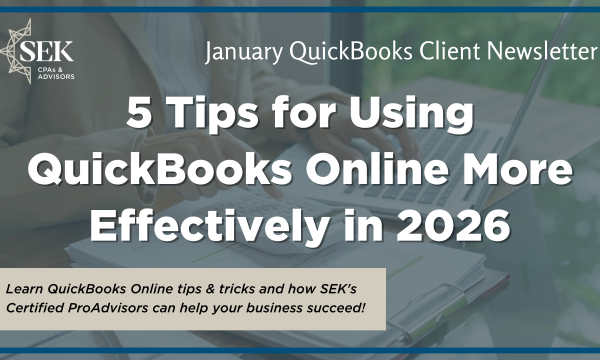SEK Announces Manager, Supervisor, and Senior Associate Promotions
The Members of SEK, CPAs & Advisors are pleased to announce the following Manager, Supervisor, and Senior Associate promotions, effective January 1, 2026:
2026 Payroll Tax Bulletin
The IRS recently released the 2026 payroll tax rates, which we have summarized in a bulletin for your convenience and quick reference.
5 Steps for Addressing Your Elderly Parents in Your Estate Plan
When creating or updating your estate plan, it’s important to address your elderly parents with both clarity and sensitivity.
2026 Rates & Dates
The IRS recently released the 2026 rates and dates, which includes individual tax rate schedules, roth retirement contributions, social security taxes, payroll tax deposit due dates for businesses, and more.
SEK Admits Two New Members of the Firm
The Members of SEK, CPAs & Advisors are pleased to announce that Cory Cuffley, QKC®, QKA®, CFP®, CPA, and Ryan Leppo, CPA, MBA, have been admitted as Members of the Firm, effective January 1, 2026:
Control Expenses and Improve Efficiency by Monitoring Financial Ratios
In general, nonprofits should work with professional financial advisors to ensure they’re complying with the IRS’s rules for tax-exempt organizations and effectively managing budgets, endowments, and other financial functions.
5 Tips for Using QuickBooks Online More Effectively in 2026
Make 2026 a more productive year by expanding your use of QuickBooks Online.
New 2026 Tax Figures for Individuals
Many tax figures are annually adjusted for inflation and typically increase each year (or at least every few years). For 2026, some additional changes are going into effect under the One Big Beautiful Bill Act, signed into law July 4, 2025.
Should Your Nonprofit Offer Staffers Dependent FSAs?
It’s no secret that robust benefits can help nonprofits attract and retain employees. One benefit you might not offer, but should consider, is a dependent care Flexible Spending Account (FSA).
Important 2026 Tax Figures for Businesses
A new year brings many new tax-related figures for businesses, and below, we provide an overview of key figures for 2026. However, please be aware that exceptions or additional rules or limits may apply.









